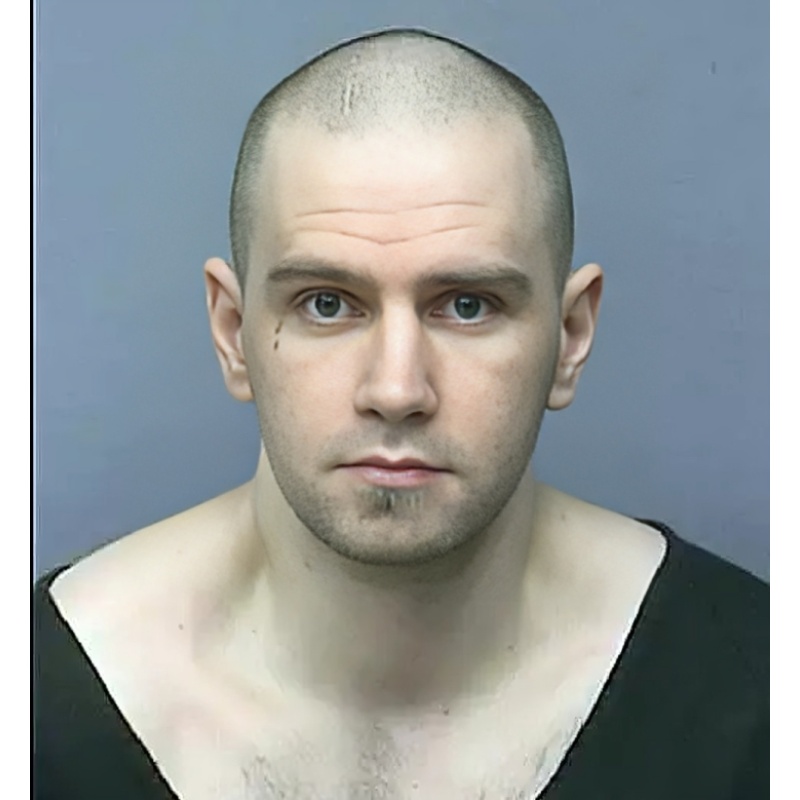SCOTT DEVER CHEEVER | Kansas Death Row | Drug Raid Shooting | Shot and killed Sheriff Matthew Samuels | Kansas v. Cheever | ALS
LongfellowSerenade 20
Scott Cheever was sentenced to death by the State of Kansas for the murder of Sheriff Matthew Samuels. According to court documents Sheriff Matthew Samuels was heading to a residence to serve an arrest warrant on Scott Cheever and when the Officer arrived he was shot and killed. Scott Cheever was arrested, convicted and sentenced to death.
$20.00
- Postage
-
$0.00 to United States
Standard Shipping
Get Additional Rates
- Select Country
- Zip/Post Code
- Quantity
Description
Scott Cheever. Autographed Letter, Signed. Handwritten, Commercial #10 (4.125 × 9.5 envelope). N.p. N.d. Content unknown. SEALED.
The Kansas Supreme Court on Friday upheld the capital murder conviction and death sentence of Scott Cheever, who was convicted of gunning down Greenwood County Sheriff Matt Samuels during a drug raid in 2005.
In a 52-page opinion penned by Justice Eric Rosen, the state’s high court rejected Cheever’s claims that errors occurred during the guilty-phase of his trial.
The court in the ruling also identified four errors — including improper comments made and the district court judge’s instructions to jurors — that occurred during the sentencing phase of Cheever’s trial. But the court said none, considered alone or collectively, reached the threshold required to throw out his death sentence.
“In light of the record as a whole, the total effect of these errors had very little, if any, likelihood of changing the jury’s ultimate conclusion that death was the appropriate sentence,” Rosen wrote.
Cheever claimed jurors who decided his fate weren’t told mitigating factors — which seek leniency in sentencing — presented in the penalty phase of a trial needn’t be proven beyond a reasonable doubt to be used in the weighing process. In death penalty cases, a jury hears evidence both in support of execution and against it, and then decides which carries greater weight.
He also claimed a prosecutor unfairly harmed his chances at life imprisonment when he told jurors they should reject requests for leniency on the basis of Cheever’s methamphetamine use.
The court expressed disapproval at the remark in the ruling, but said that the error was harmless.
The decision to uphold Cheever’s death sentence was 6-1.i
Kansas v. Cheever
Kansas v. Cheever, 571 U.S. 87 (2013), was a United States Supreme Court case in which a unanimous Court held that the Fifth Amendment does not prevent the prosecution from introducing psychiatric evidence to rebut psychiatric evidence presented by the defense
Background
In January 2005, Scott Cheever shot and killed Greenwood County Sheriff Matthew Samuels at the residence of Darrell and Belinda Coopers in Hilltop, Kansas. When Samuels arrived, the Coopers, Cheever, and two others were using methamphetamines. At the time, Cheever had an outstanding warrant for which Samuels would arrest him.
At trial, Cheever asserted a voluntary intoxication defense and argued that the methamphetamine use rendered him mentally incapable of the premeditation required for murder. During the trial, the judge ordered Cheever to undergo a psychiatric examination conducted by a psychiatrist hired by the government. The prosecution sought to bring the interview transcript into evidence to impeach Cheever's testimony regarding the order of events at the Coopers' residence, which the court allowed. After the defense rested their case, the prosecution called the psychiatrist to the stand as a rebuttal witness to respond to the defense's claims regarding Cheever's mental capacity at the time of the crime. The trial court allowed the psychiatrist's testimony as a rebuttal witness. The jury found Cheever guilty and, at a separate sentencing hearing, sentenced him to death. The Kansas Supreme Court held that the admission of the government psychiatrist's testimony into evidence violated Cheever's Fifth Amendment rights.
Opinion of the Court
Justice Sotomayor delivered the opinion of the Court.
Reaffirming its prior ruling in Buchanan v. Kentucky, 483 U.S. 402 (1987), the Court held that when "a defense expert who has examined the defendant testifies that the defendant lacked the requisite mental state to commit an offense, the prosecution may present psychiatric evidence in rebuttal." Not allowing this would "undermine the adversarial process" and permit a defendant to provide "a one-sided and potentially inaccurate view of his mental state" at the time of the crime, through an expert. The Fifth Amendment does not permit a defendant who chooses to testify to refuse to submit to cross-examination.
The Court also drew a distinction between "mental status," at issue in Buchanan, and "mental disease or defect," a provision of Kansas law which does not include voluntary intoxication, calling the former a broader term than the latter. Kansas' usage of the court-ordered exam to rebut the voluntary-intoxication defense is not prohibited by the Fifth Amendment.ii
VIDEO: Scott Cheever Kansas Solitary confinement Death Row | https://youtu.be/ZnSpAX-f7yM
VIDEO: Kansas v. Cheever: Oral Argument - October 16, 2013 | https://youtu.be/eDzng_8KYbA
Archiving Protocol:
• Handled with White Gloves ab initio
• Photo Pages/Sheet Protectors: Heavyweight Clear Sheet Protectors, Acid Free & Archival Safe, 8.5 × 11, Top Load
• White Backing Board—Acid Free
Shipping/Packaging: Rigid Mailer 9.5 × 12.5. White, self seal, stay flat, kraft cardboard, no bend. Each rigid mailer is made of heavy cardboard, which has strong resistance to bending and tearing. Thicker that the USPS mailers. Shipping cost never more than it absolutely has to be to get it from me to you.
i https://www.kansas.com/article91217657.html
ii Kansas v. Cheever (2023) Wikipedia. Wikimedia Foundation. Available at: https://en.wikipedia.org/wiki/Kansas_v._Cheever (Accessed: 5 October 2023).
Payments & Returns
- Payment Methods
- PayPal, Money Order
Postage & Shipping
- Item Location
- 54911, Wisconsin, United States
- Ships To
- Worldwide
- Pick-ups
- No pick-ups
- Returns Accepted
- No





